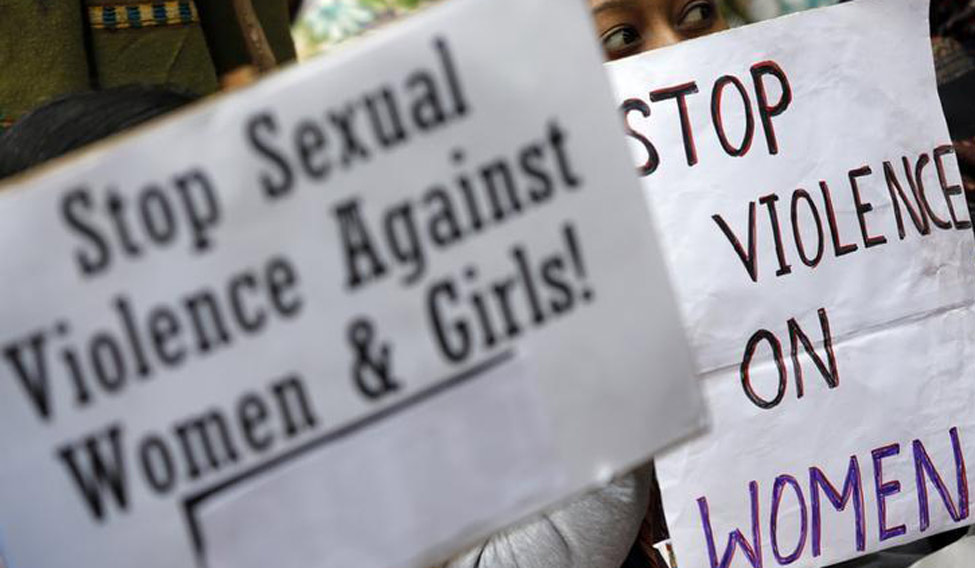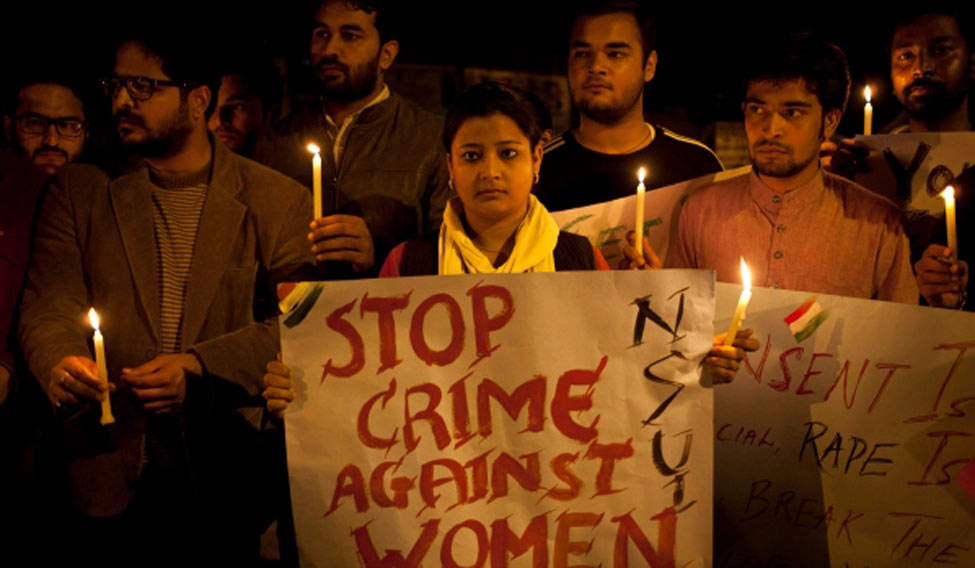Five years ago, on a cold December night, Jyoti Singh Pandey, boarded a nearly empty bus in Delhi and was gang-raped. It shocked the conscience of the nation and the world. Nirbhaya, as she was called by the media, battled serious injuries, but even as doctors tried to save her, she died within two weeks of the incident.
Five years is a long time for any administrative system to tighten its system of dealing with something as serious as sexual violence. However, nothing seems to have changed as rapes are reported every day from all corners of the country. Rape victims in India are still being discriminated against, ostracised and denied justice.
As outrage spilled out on the streets, the government set up the Justice Verma Committee to recommend amendments to the criminal law for quicker trial and enhanced punishment for criminals involved in sexual crimes. This should have been done ages ago. It was a typical knee-jerk reaction caused by the palpable anger at huge public meetings after the Nirbhaya incident.
Men and women of all ages flocked in large numbers at meetings, demanding an end to sexual violence and enactment of criminal justice reforms.
When the government brought in stricter laws, it seemed easier for victims to get access to justice and critical care.
The Criminal Law (Amendment) Act, 2013, rightly expanded the definition of sexual offences to include sexual harassment, voyeurism and stalking. It made punishment more stringent, required police officers to quickly file complaints of sexual assault and act on it. It also specified medical guidelines that included counselling of victims and their families. Rape survivors were, for the first time, entitled for compensation.
Despite these measures, nothing much has changed on the ground. Shockingly, a recently released Human Rights Watch Report (HRWR) says none of these measures have been implemented.
Researchers of HRW conducted numerous interviews with rape victims, their families, police, lawyers, human right activists, doctors, forensic experts and government officials to put the report together. The interviews were conducted in Uttar Pradesh, Haryana, Rajasthan and Madhya Pradesh. These states were picked as they had a large number of rape cases.
Jayshree Bajoria, researcher, Asia Division, Human Rights Watch, said that five years after the legal changes spurred by protests over the Delhi gang-rape, these reforms are yet to fructify.
For instance, the Criminal Law (Amendment) Act, 2013 made police failure to register a complaint of rape a crime punishable with up to two years in prison. But, there is not a single record of a police official being charged under the provision.
Having a tough law in place is not the answer. It has to have sensitive, responsible officials implementing it.
Take the case of 23-year-old Sadhna (name changed), a rape survivor who has seen many of these provisions violated. She was carrying food for her sick mother in a village in Neemuch district of Madhya Pradesh and a car with an acquaintance stopped, offering her a lift. As there was another woman inside the car, she readily accepted. After a while, the woman got off. The car stopped soon after as the driver said there was a puncture. As she got out of the car, three of the passengers pushed her to the ground and gang-raped her.
The doctor who examined her after the incident asked her why she was walking alone at night. He also subjected her to the 'two-finger' test, which is illegal.
Helped by others, she filed a police complaint. But instead of quickly moving to arrest the accused, the police detained her and her father. She was beaten up and the police forced her to tell the magistrate that she had filed a false complaint. They also threatened to arrest the father on false charges as well.
The police filed a closure report in December 2015 saying that it was a false complaint filed due to a land dispute with the accused.
Sadhna’s husband and his family abandoned her. She was forced to go and live with her parents. But they had to leave their house after receiving threats from the accused.
“I lost everything. I did not leave my home for a month after the incident. I was tired of listening to taunts from the neighbours. I just lay like a mad woman at home. It felt like I had lost my mind,” she told Human Rights Watch.
Though the law clearly stipulates that medical and counselling care must be provided to the victim, Sadhna got none of it.
With the help of a local civil society organisation, she wrote to several senior police officials and also to the State Human Rights Commission detailing how she had been intimidated by the police. She received no reply.
The police were found to have misused its power and authority to threaten rape victims and their families to withdraw complaints or not file it in the first place. In November 2016, Sadhna found the courage to file an appeal against the police’s closure report, testifying that they had forced her to retract her charge. The court reopened her case and it is presently pending.
 [File photo] More often than the victims, it is the authorities that refuse to file sexual assault cases | Reuters
[File photo] More often than the victims, it is the authorities that refuse to file sexual assault cases | Reuters
The 82-page HRW report, “Everyone Blames Me: Barriers to Justice and Support Services”, said that rape survivors in India faced significant obstacles to obtaining justice and critical support services. Without mincing words, it said that it found rape survivors and victims of sexual violence suffered further humiliation at police stations and hospitals.
The police were found to be unwilling to register complaints. Medical professionals continued to perform the degrading 'two-finger' test which had no forensic basis and was illegal. This was further compounded by inadequate health care, counselling and legal support for victims during the criminal trial.
Some of the report’s main findings:
- The police were found to resist filing of the First Information Report, especially if victims were poor or from a marginalised social community.
- In four specific cases, they found that the police delayed investigations and the filing of FIRs.
- The researchers found parents of the rape victims feared for their daughter’s safety as the accused easily got bail and threatened them or their witnesses.
- As India does not have a witness protection law, rape survivors and witnesses to the act become vulnerable to pressure.
- A 13-year-old who was raped by a well-to-do man from a landowning community in Maharashtra in 2012 was taken into custody by the police when she reported the rape. She was held for nearly two weeks by the police who wanted her to retract the charges.
- Khap panchayats and unofficial village caste councils were found to often pressure dalits and low-caste families to retract cases when the accused is from a socially upward or dominant caste.
- Medical professionals were not following government guidelines of procedures to be followed when a rape victim approaches them.
- Healthcare systems were found to have largely failed to provide therapeutic care and counselling to rape survivors. Nor were they given proper advice on access to safe abortions or to go in for tests to detect sexually transmitted diseases.
- Though there is a Supreme Court judgment that the police must provide legal assistance and keep a list of legal aid options available to sexual assault victims, this was not done. The HRW found that in no case investigated by the police was this done!
- There was a lot of brouhaha when a central fund was created in 2015 to ensure that all rape victims got a compensation of Rs 3,00,000. Of the 21 case studies of rape victims that the HRW studied, only three were able to access the system of compensation.
- The One Stop Centre Scheme set up to integrate various services like police assistance, legal aid, medical help and counselling was largely ineffective. Though there are 151 such centres, there is little awareness about it. Lack of co-ordination between different departments and ministries was also seen.
Ironically, when the law worked the way it should in dealing with rape cases, male-dominated khap panchayats stepped in to save the accused.
Kalpana (name changed), a dalit from Kaithal district in Haryana, was gang-raped by six men of the dominant jat community on March 10, 2015. The police swiftly investigated and arrested all six within 18 days and filed a charge-sheet against them for gang-rape, kidnapping and abuse under dalit protection laws.
The victim’s family was threatened by the khap panchayat. Kalpana was forced to turn hostile in court, altering her testimony and helping the acquittal of the accused. She and her family had to move away from the village.
Shockingly, many have faced the same fate after the stricter laws came into force.
In another case, a Samajwadi Party leader, known to be a local goon, barged into a couple’s house in Lalitpur, Uttar Pradesh, with two of his cronies. They first beat the husband and took him away, while the leader went on to rape the 22-year-old woman. When she went to the police, they refused to accept her complaint, because of the rapist's political clout. It took the police eight months to register an FIR. But as the couple had to face repeated threats and harassment from the accused, they had to flee from their village.
The amendments in 2013 criminalised police failure to register a rape complaint. However, no action was taken under Section 166A of the Code of Criminal Procedure against police officials who refused to file the Lalitpur case. But, the magistrate too did not direct that a case be filed against the erring police officials.
Meenakshi Ganguly, South Asia Director, Human Rights Watch, said that reporting rape should not end up becoming a nightmare for the victim. This will only be rectified if the government ensures that there is timely medical aid, counselling and legal aid available, she said.
Defence lawyers often use derogatory language to intimidate victims to break their resolve and shame them. This is another reason why rape victims are not ready to knock on the doors of the judiciary.
After the new laws were put in place, there has been an increase rape complaints by 39 per cent. Have rape incidents increased or are more people coming forward to reporting the crime?
Two years after the Nirbhaya incident, the ministry of health and family welfare issued guidelines for medico-legal care for survivors of sexual violence. The idea was to standardise the examination and treatment of rape survivors by healthcare professionals. One of the procedures was to reject the 'two-finger' test and not guess or pass generalised judgments on whether the victim was habituated to sex.
Rape survivors' lives are pockmarked with pain, injustice, discriminatory and judgmental behaviour by the police and medical professionals and above all, threats from the accused. Most of the survivors choose not to fight a battle that they cannot win.
It is certainly not the case of the government not caring. It is just that its new initiatives to ensure support to sexual assault victims have not worked the way they should. It has been largely ineffective as there has been no real legal assistance to help victims get justice and navigate the complicated judicial system.
Just having 524 fast-track courts to expedite trials dealing with crimes against women and children will not be enough. Good intent is fine, but there has be effective support systems that work.








